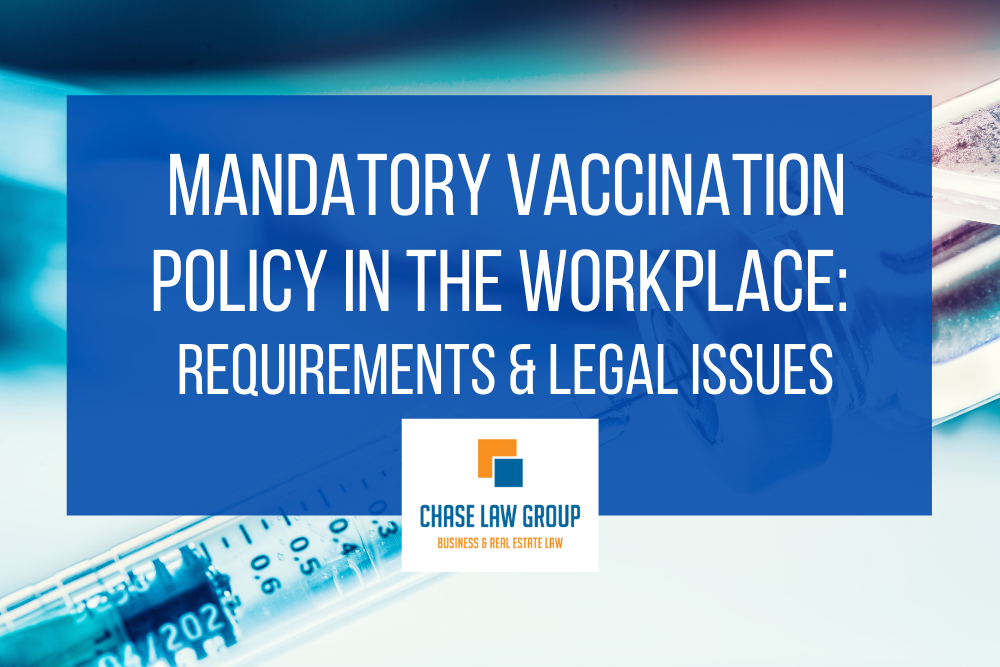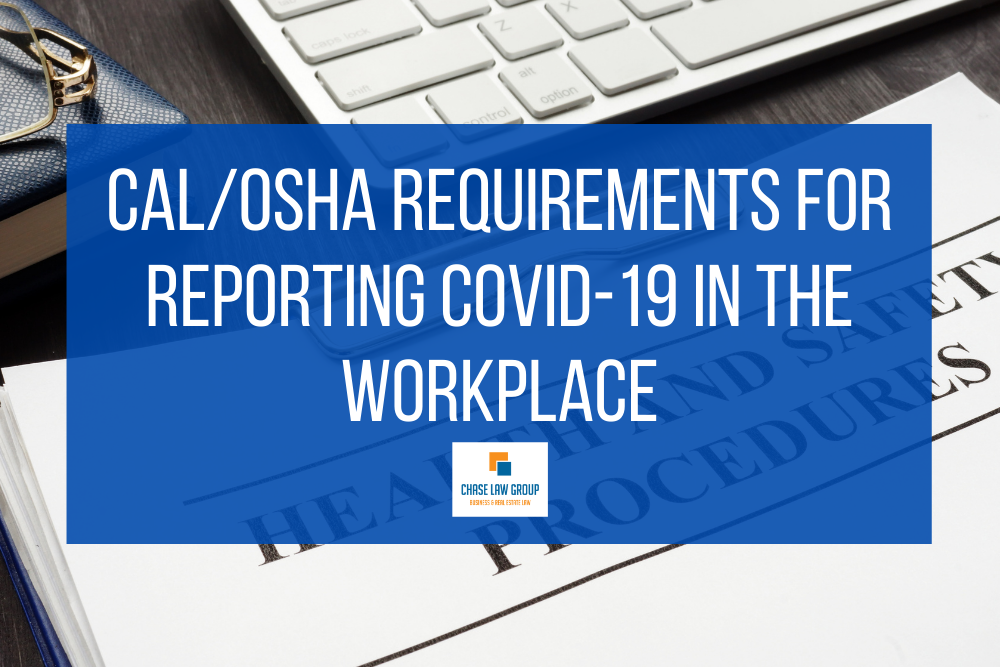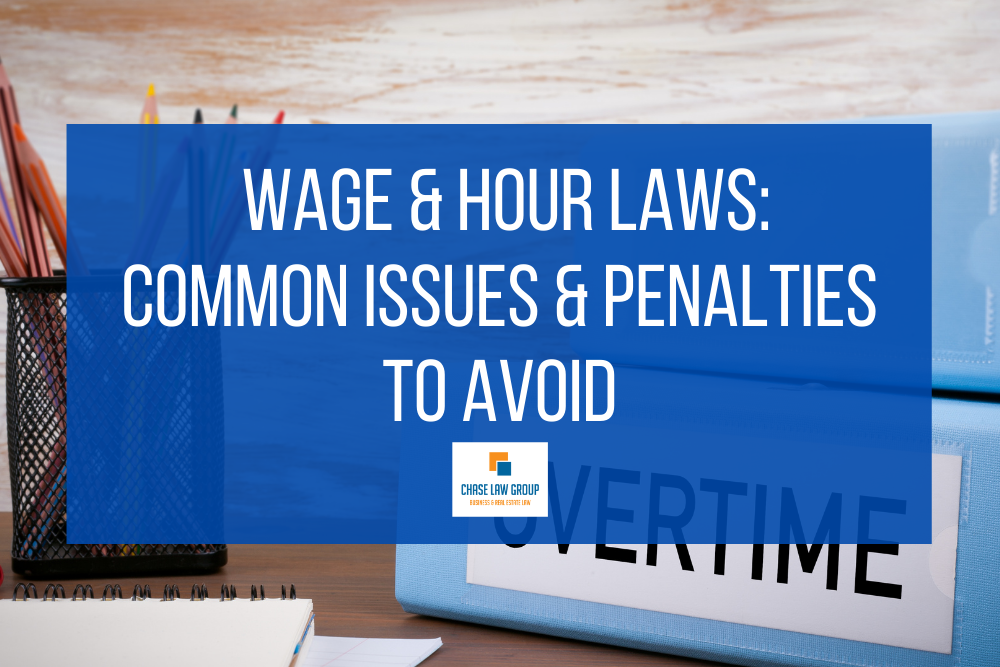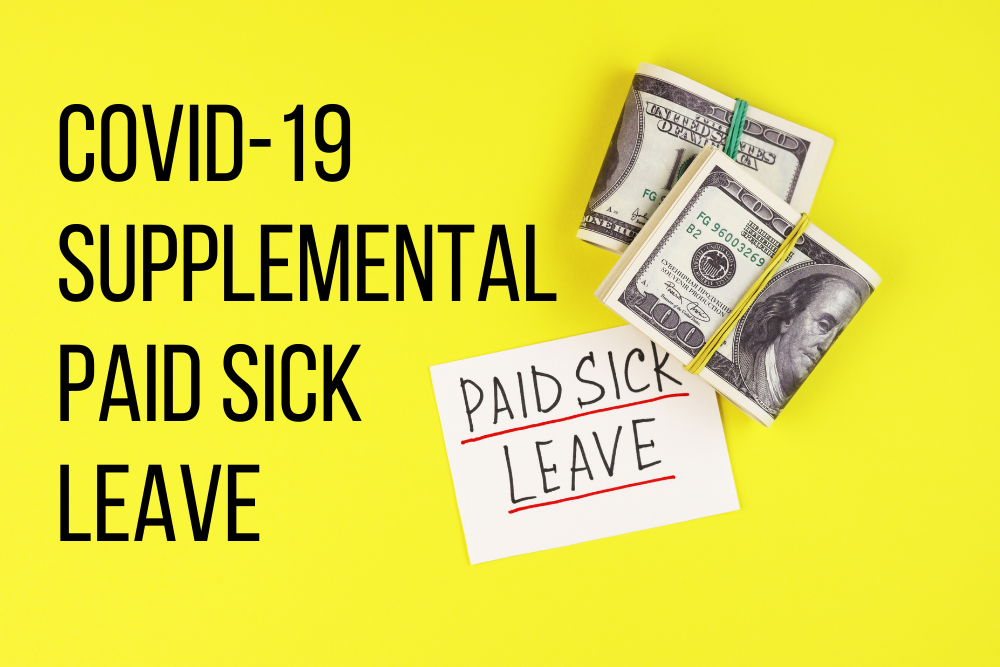Enacting and Enforcing a Mandatory Vaccination Policy in the Workplace: Understand the Legal Requirements and Issues That Can Arise
By Admin August 11, 2021 Category: Business Law

In the face of the recent upswing of Covid-19 cases related to the Delta variant, many employers have elected to require all of their workers be vaccinated. But what is an employer to do if an employee refuses to be vaccinated? As a preliminary matter, the California Department of Fair Employment and Housing (“DFEH”) has issued an opinion that California employers may mandate Covid-19 vaccinations for its employees. However, the employer must engage in an interactive dialogue with employees who have a disability-related or religious reason for refusing an FDA-approved vaccine. Note however, an employee who doesn't "trust that the... READ MORE
Cal/OSHA requirements for reporting COVID-19 in the workplace
By Admin July 29, 2021 Category: Business Law

Cal/OSHA has enacted a standard detailing notification and reporting requirements for when there is a COVID-19 case in the workplace. Per the standard, a COVID-19 case is defined as someone who: Has a positive COVID-19 test;Has a positive COVID-19 diagnosis from a licensed healthcare provider;Is subject to a COVID-19-related order to isolate issued by a local or state health official; orHas died due to COVID-19, in the determination of a local health department or per inclusion in the COVID-19 statistics of the country. Under Cal/OSHA’s standard, when the employer knows or should have known there is a COVID-19 case in... READ MORE
The Risks of Failing to Comply with California’s Wage and Hour Laws: Lawsuits and Penalties Require Vigilant Compliance by Employers
By Admin July 29, 2021 Category: Business Law

Employers face substantial risks due to misclassification of their workers and not abiding by the myriad of California wage and hour laws. These landmines for unaware employers, have enormous, business-breaking ramifications due to the substantial penalties that could quickly compound and potentially be a million-dollar liability for an organization. By understanding the applicable requirements and their penalties, employers will better understand their exposure and ensure they take necessary proactive steps to avoid them. What are the most common issues that arise when facing a wage-related claim? Overtime: Unpaid overtime for all work performed in excess of 8 hours in a... READ MORE

When you are moving your business into a new space whether an office, industrial or retail location, there are a number of decisions and protections you’ll want to consider before signing a lease agreement with a landlord. The lease agreement comes in many forms and every situation is unique, which is why it’s important for you as the tenant to review the document with a qualified business or real estate attorney. Keep in mind that lease terms are always negotiable. You can assume that the document presented to you by the landlord favors the landlord and of course in many... READ MORE
How to handle contested credit card charges by customers
By Admin June 16, 2021 Category: Business Law

As business owners, sometimes there are clients out there who may try to get out of paying you by contesting a charge for your products or services on their credit card, claiming it as “fraud” to their card issuer or bank. It’s frustrating to think that a customer would go to this extent to not pay you, but it does happen in business. Here’s what you should know and how best to handle a situation like this. Credit card companies don’t control your contract Regardless of what the credit card company does with the charge, whether they credit the customer’s... READ MORE
Small businesses with 5+ employees must offer retirement plans
By Admin May 11, 2021 Category: Business Law

Employers with five or more employees are required to participate in CalSavers if they do not already have a workplace retirement plan. CalSavers is a retirement savings program for private sector workers whose employers do not offer a retirement plan. The CalSavers program is being implemented by the state and enables small businesses and employees to make an automatic payroll contribution into a personal IRA retirement account. The program is designed to be self-sustaining, so there will be no taxpayer funding and no employer or state liability for the program and the retirement account is overseen by the CalSavers Retirement... READ MORE
Be Prepared: Avoid Household Employee Wage and Hour Claims
By Admin April 08, 2021 Category: Business Law

Many families hire workers at their home to provide a variety of services from housecleaning, cooking, child care, as well as elderly care. However, most families are unaware that the same or similar wage and hour laws that apply at places of business also apply to the people who work for them at home. In fact, we have seen an alarming trend of high exposure (Several Hundred Thousand Dollars) domestic worker claims in recent years. Consequently, it is critical that household employers are in compliance with all applicable wage and hour requirements to avoid their exposure to these wage and hour claims.... READ MORE
California’s New Covid-19 Supplemental Paid Sick Leave: What you need to know
By Admin April 08, 2021 Category: Business Law

On March 19, 2021, Governor Gavin Newsome signed a new Covid-19 Supplemental Paid Leave (“SPSL”) into law. The new SPSL is similar to the prior Covid-19 Supplemental Paid Sick Leave law that expired on December 31, 2020. The new law came into effect on March 29, 2021 and applies retroactively to January 1, 2021. The key and important issues to understand are as follows: Covered Employers: All employers with 26 or more employees are covered by the new SPSL. Covered Employees: The new law added 5 additional types of coverages that did not exist in the prior laws. The covered... READ MORE

Running a business is challenging enough despite the additional complications that can come with unforeseen circumstances whether that be a pandemic or sudden need to pivot quickly. The Small Business Administration (SBA) has long noted that 80% of businesses survive the first year, but almost half of the businesses fail by year five. Why is this? Why Many Small Businesses Fail The reason that these small businesses fail, first and foremost, is directly related to lack of business planning. Over the past several years, Chase Law Group has worked with entrepreneurs and small business owners from the time they start... READ MORE
Confused About PPP Second Round and Loan Forgiveness?
By Admin February 12, 2021 Category: Business Law

March 31st 2021 is the last day to apply for a first or second-round PPP loan. While the rules are a bit unclear as to whether a business seeing declines in one quarter but positive in subsequent quarters still qualifies for loan forgiveness eligibility, there are a number of areas to consider as to whether your business should apply for the second-round of PPP. (Related: Financial Assistance To Small Businesses In Response To COVID-19) Applying for a first-time PPP loan? If you didn’t get funds for the first PPP round you can apply for a first-time loan. Loans are capped... READ MORE

